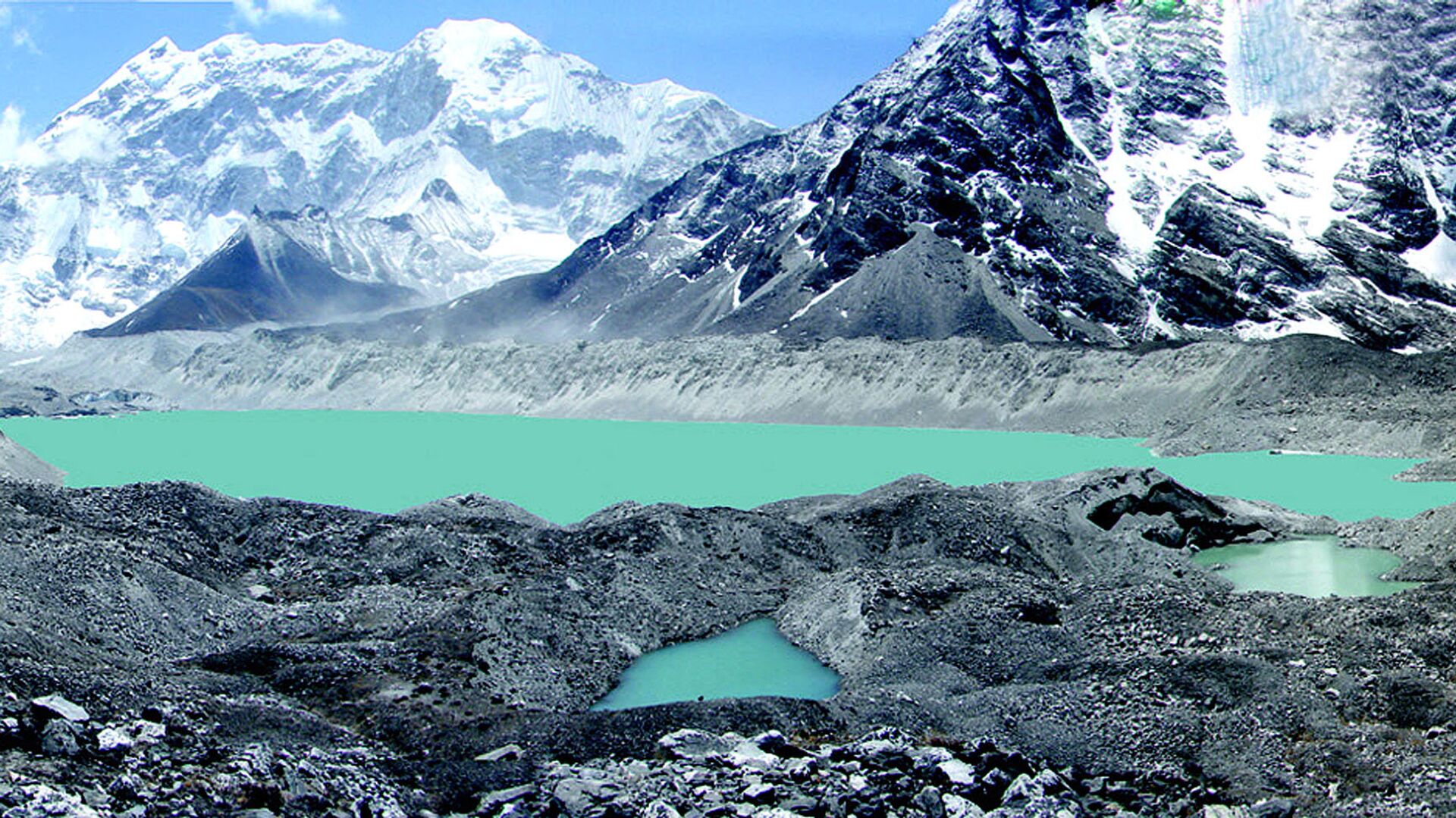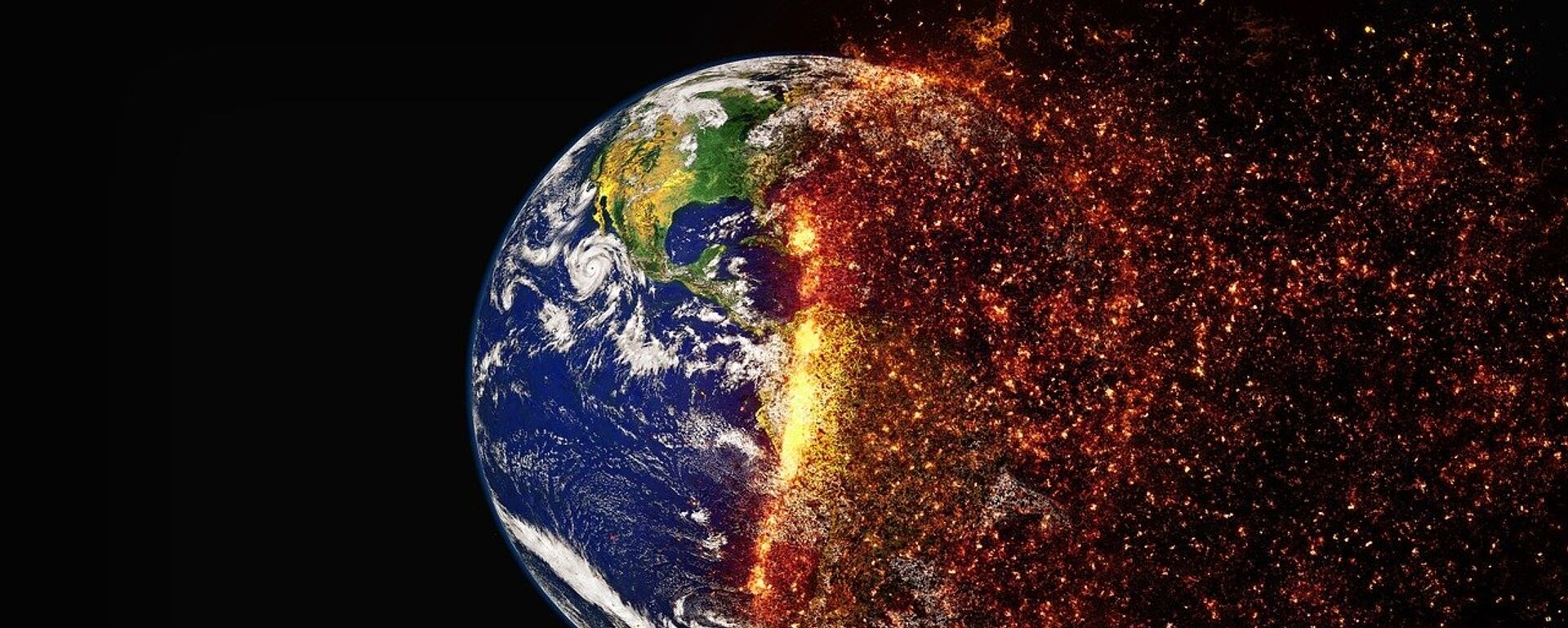https://sputnikglobe.com/20230621/himalayan-glaciers-on-track-to-lose-80-of-their-volume-over-climate-change-1111349803.html
Himalayan Glaciers on Track to Lose 80% of Their Volume Over Climate Change
Himalayan Glaciers on Track to Lose 80% of Their Volume Over Climate Change
Sputnik International
Researchers are warning in their report that if climate change is not addressed, the Himalayan glaciers are on track to lose 80% of their volume.
2023-06-21T03:23+0000
2023-06-21T03:23+0000
2023-06-21T03:22+0000
science & tech
report
planet
study
climate change
paris climate deal
himalayas
glacier
beyond politics
https://cdn1.img.sputnikglobe.com/img/104695/13/1046951302_631:0:2370:978_1920x0_80_0_0_400a48c4a6ea833a7d80387473c34073.jpg
Glaciers in Asia’s Hindu Kush Himalaya could lose up to 80% of their volume by the end of the century, a development expected to cause dire effects on the freshwater millions of people rely on, a new report has revealed.A report published by Kathmandu-based International Centre for Integrated Mountain Development (ICIMOD) on Tuesday revealed the melting glaciers could result in an increase of flash floods and avalanches in the region. It outlined that the great melt would also cause fresh water shortages for 240 million people, as well as the 1.65 billion people who rely on the 12 downstream rivers that come from those mountains.“The people living in these mountains who have contributed next to nothing to global warming are at high risk due to climate change,” said Amina Maharjan, a migration specialist and one of the authors of the study. “For them, this is home, and their livelihoods are mostly dependent on agriculture, livestock, tourism, and medicinal and aromatic plants,” Maharjan adds.The report adds that the Himalayan communities are being affected by climate change more so than in any other part of the world, and the melting of its glaciers, snow and permafrost are “unprecedented and largely irreversible.”“Once ice melts in these regions, it’s very difficult to put it back to its frozen form,” said Pam Pearson, director of the International Cryosphere Climate Initiative.Despite the US rejoining the Paris Agreement in 2021, the nation, as well as China, continue to be Earth’s worst polluters and have continued to bulldoze ahead with new fossil fuel projects, according to one report. Just last year, China approved permits for 168 coal-fired power plants and in early March of this year, the Biden administration approved a large scale oil drilling project in Willow, Alaska.Experts warn that if the ongoing fossil fuel projects are not halted, they will produce enough carbon dioxide to warm the planet about 2 degrees Celsius this century.
https://sputnikglobe.com/20230509/nearly-half-of-earths-land-may-change-climatic-zone-by-2100-1110222950.html
himalayas
Sputnik International
feedback@sputniknews.com
+74956456601
MIA „Rossiya Segodnya“
2023
News
en_EN
Sputnik International
feedback@sputniknews.com
+74956456601
MIA „Rossiya Segodnya“
Sputnik International
feedback@sputniknews.com
+74956456601
MIA „Rossiya Segodnya“
global warming, climate change, himalayan glaciers, study, report
global warming, climate change, himalayan glaciers, study, report
Himalayan Glaciers on Track to Lose 80% of Their Volume Over Climate Change
The recently-published report also found that glaciers in the Hindu Kush and Himalaya mountain range region melted 65% faster in the 2010s compared to the previous decade.
Glaciers in Asia’s Hindu Kush Himalaya could lose up to 80% of their volume by the end of the century, a development expected to cause dire effects on the freshwater millions of people rely on, a new report has revealed.
A
report published by Kathmandu-based International Centre for Integrated Mountain Development (ICIMOD) on Tuesday revealed the melting glaciers could result in an increase of flash floods and avalanches in the region.
It outlined that the great melt would also cause fresh water shortages for 240 million people, as well as the 1.65 billion people who rely on the 12 downstream rivers that come from those mountains.
“The people living in these mountains who have contributed next to nothing to global warming are at high risk due to climate change,” said Amina Maharjan, a migration specialist and one of the authors of the study.
“Current adaptation efforts are wholly insufficient, and we are extremely concerned that without greater support, these communities will be unable to cope.”
“For them, this is home, and their livelihoods are mostly dependent on agriculture, livestock, tourism, and medicinal and aromatic plants,” Maharjan adds.
Regions on Earth covered in ice and snow—referred to as the cryosphere—take the brunt of climate change, with recent research finding that Mount Everest’s glaciers have lost 2,000 years' worth of ice in the last 30 years, according to one report.
Those living in the Himalayan communities have already felt the adverse effect of climate change as well, as India’s holy town of Joshimath began sinking in February of this year due to a combination of climate change and new construction projects in an attempt to attract and accommodate tourists.
The report adds that the Himalayan communities are being affected by climate change more so than in any other part of the world, and the melting of its glaciers, snow and permafrost are “unprecedented and largely irreversible.”
“Once ice melts in these regions, it’s very difficult to put it back to its frozen form,” said Pam Pearson, director of the International Cryosphere Climate Initiative.
“It’s like a big ship in the ocean. Once the ice starts going, it’s very hard to stop. So, with glaciers, especially the big glaciers in the Himalayas, once they start losing mass, that’s going to continue for a really long time before it can stabilize,” added Pearson, who was not involved in the report.
Despite the US rejoining the Paris Agreement in 2021, the nation, as well as China, continue to be Earth’s worst polluters and have continued to bulldoze ahead with new fossil fuel projects, according to one
report. Just last year, China approved permits for 168 coal-fired power plants and in early March of this year, the Biden administration approved a large scale oil drilling project in Willow, Alaska.
Experts warn that if the ongoing fossil fuel projects are not halted, they will produce enough carbon dioxide to warm the planet about 2 degrees Celsius this century.



